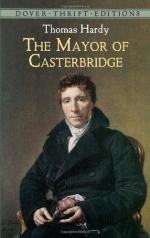He went secretly and alone, not a soul of the many who had known him being aware of his departure. Elizabeth-Jane accompanied him as far as the second bridge on the highway—for the hour of her appointment with the unguessed visitor at Farfrae’s had not yet arrived—and parted from him with unfeigned wonder and sorrow, keeping him back a minute or two before finally letting him go. She watched his form diminish across the moor, the yellow rush-basket at his back moving up and down with each tread, and the creases behind his knees coming and going alternately till she could no longer see them. Though she did not know it Henchard formed at this moment much the same picture as he had presented when entering Casterbridge for the first time nearly a quarter of a century before; except, to be sure, that the serious addition to his years had considerably lessened the spring to his stride, that his state of hopelessness had weakened him, and imparted to his shoulders, as weighted by the basket, a perceptible bend.
He went on till he came to the first milestone, which stood in the bank, half way up a steep hill. He rested his basket on the top of the stone, placed his elbows on it, and gave way to a convulsive twitch, which was worse than a sob, because it was so hard and so dry.
“If I had only got her with me—if I only had!” he said. “Hard work would be nothing to me then! But that was not to be. I—Cain—go alone as I deserve—an outcast and a vagabond. But my punishment is not greater than I can bear!”
He sternly subdued his anguish, shouldered his basket, and went on.
Elizabeth, in the meantime, had breathed him a sigh, recovered her equanimity, and turned her face to Casterbridge. Before she had reached the first house she was met in her walk by Donald Farfrae. This was evidently not their first meeting that day; they joined hands without ceremony, and Farfrae anxiously asked, “And is he gone—and did you tell him?—I mean of the other matter—not of ours.”
“He is gone; and I told him all I knew of your friend. Donald, who is he?”
“Well, well, dearie; you will know soon about that. And Mr. Henchard will hear of it if he does not go far.”
“He will go far—he’s bent upon getting out of sight and sound!”
She walked beside her lover, and when they reached the Crossways, or Bow, turned with him into Corn Street instead of going straight on to her own door. At Farfrae’s house they stopped and went in.
Farfrae flung open the door of the ground-floor sitting-room, saying, “There he is waiting for you,” and Elizabeth entered. In the arm-chair sat the broad-faced genial man who had called on Henchard on a memorable morning between one and two years before this time, and whom the latter had seen mount the coach and depart within half-an-hour of his arrival. It was Richard Newson. The meeting with the light-hearted father from whom she had been separated half-a-dozen




